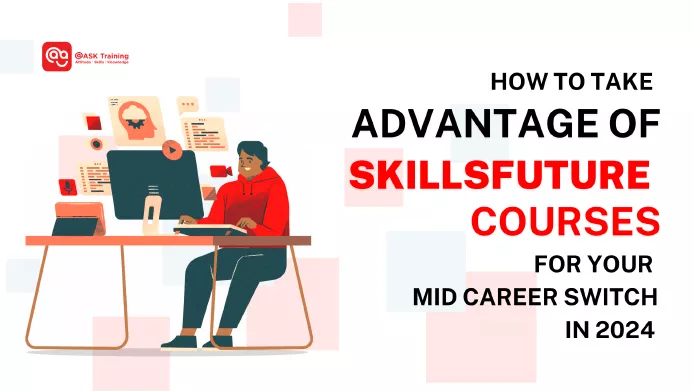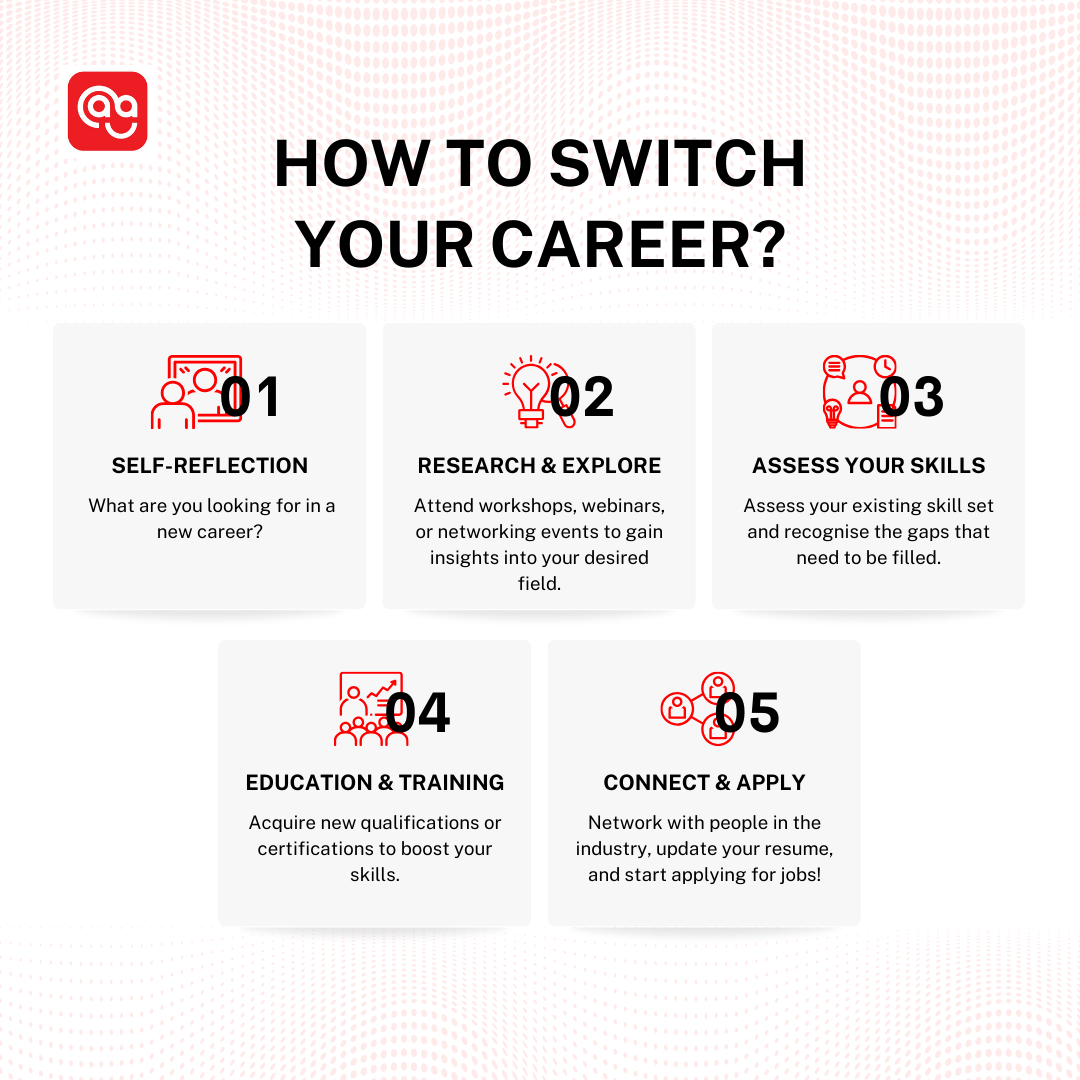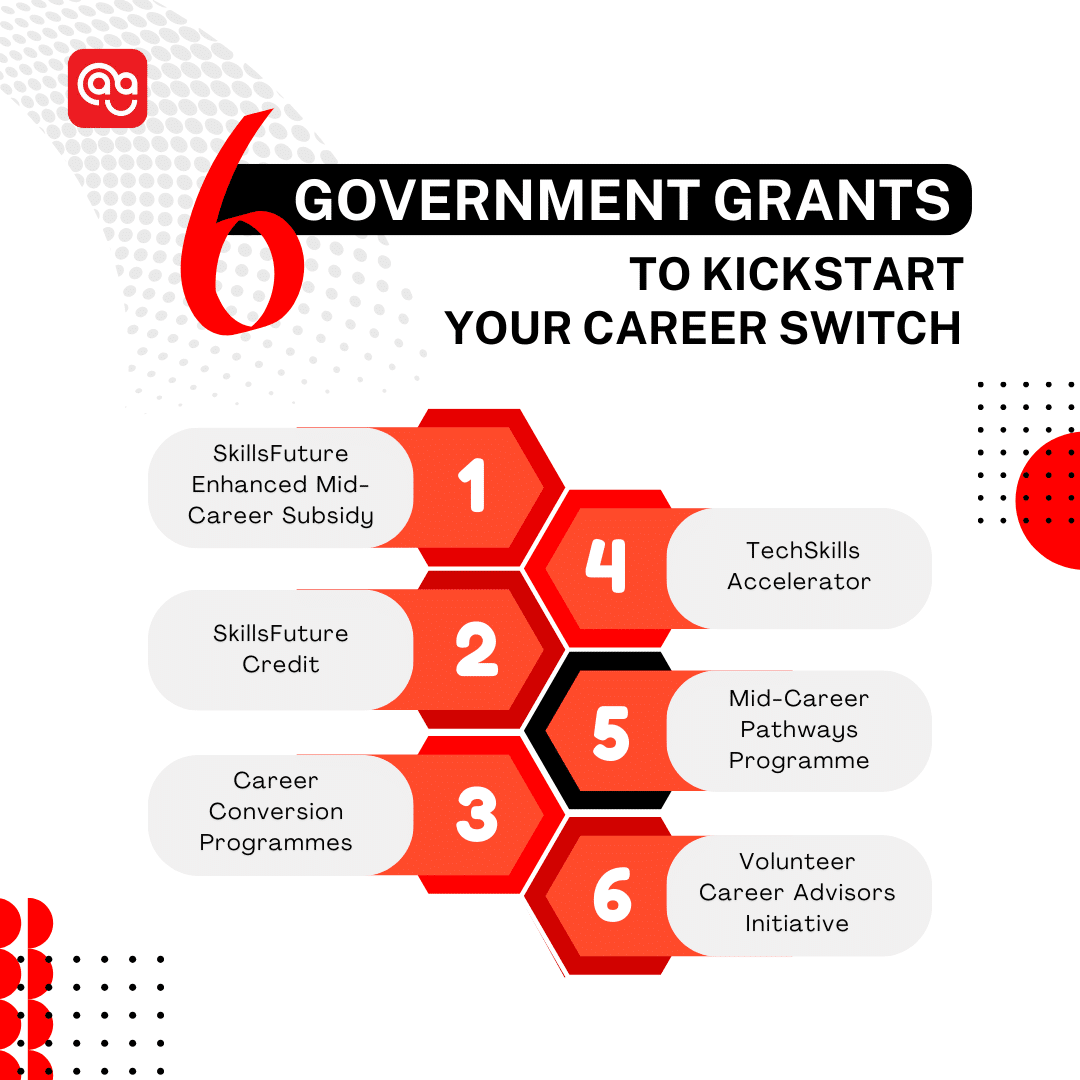
As we step into a new year filled with possibilities, are you contemplating a fresh start in your career?
Perhaps you’re considering a mid-career switch to a more fulfilling path or aiming to acquire new skills that align with the evolving demands of Singapore’s current job market.
According to the Ministry of Manpower’s data released in December 2023, the top jobs in demand are in the following fields:
- IT/Technology: Software, Web and Multimedia Developers, Data Scientists, Infrastructure and Operations Officers, and Artificial Intelligence (AI) Specialists are among the most in-demand roles in the technology sector.
- Finance and Sales: Commercial and Marketing Sales Executives, Budgeting and Financial Accounting Managers, and Business Development Managers are in high demand in the finance and sales sectors.
- Healthcare: Jobs in the healthcare sector, such as Nurses, Doctors, and Allied Health Workers, continue to be in demand to support Singapore’s ageing population and healthcare needs.
- Education: Pre-Primary Education Teachers are also among the top jobs in demand.
- Digital Marketing: Jobs in the digital marketing sector such as Digital Marketer, Social Media Specialist, and SEO Specialist continue to be in demand.
As a SkillsFuture Singapore-appointed Continuing Education Training Centre (CETC), @ASK Training is here to help you acquire the essential knowledge and skills you need for a successful mid-career switch in 2024!
Before breaking down into the details, what are the clear signs that it’s time for you to make the switch in your career path?
When Do I Know it is Time to Switch My Career?
It’s a question that many individuals grapple with, and understanding the signs that indicate the need for a career switch is crucial.

Here are the main indicators that it might be time for you to consider a career switch:
Not Enjoying Your Work
If you often feel bored or not excited about your job, and it’s hard to find joy in what you do, it could mean your passion for your work is fading. A fulfilling job is one that you like and that keeps you interested.
Feeling Stuck and Not Growing
If your job feels like it’s not going anywhere, and you don’t see chances to learn new things or get promoted, it might be a sign to explore new career paths. Finding ways to grow is important for a happy work life.
Feeling Tired and Stressed All the Time
If you feel tired and stressed a lot, even after trying to feel better, it might be because your current job is taking too much from you. It could be a hint that a change is needed for your well-being.
Evolving Industry Trends and Technology
Staying up to date with advancements in technology and industry trends is crucial for career growth. For instance, fields like AI, digital marketing and IT are continuously evolving, offering opportunities for those willing to adapt and learn new skills.
Stay updated and seek opportunities in these evolving industries through Workforce Singapore (WSG) Jobs Transformation Map.
Financial Stability
Assessing the financial aspect of your career is essential. If you find yourself struggling to meet your financial goals or feel undervalued in terms of compensation, it might be worth considering a switch to a career path that offers better financial stability and rewards.
For example, a Data Analyst’s average salary per year is $76,331 in Singapore. A Digital Marketer’s average salary is $50,894 annually.
Recognising these signs can help you decide if it’s a good time to think about a new direction for your career. This brings us to the next important question.
What Does it Take to Switch My Career?
Embarking on a career change can be both exciting and challenging, but with careful planning and the right mindset, it is absolutely possible!

Here are a few steps and considerations to guide you through the process:
Self-Reflection
Start by thinking about what you enjoy doing at work. What aspects of your current job do you enjoy, and what are you looking for in a new career?
If you have trouble figuring out what’s next, try taking CareersFinder’s personalised quiz to get recommendations on upskilling.
Research and Exploration
Investigate the industries and roles that pique your interest. Attend workshops, webinars, or networking events to gain insights into your desired field.
WSG also provides a list of career fairs and workshops that you can attend to get a better perspective on which career switch you’re interested in.
Skill Assessment
Identify the skills required in your target career. Assess your existing skill set and recognise the gaps that need to be filled. This is a crucial step in planning your transition.
Here are a few assessments available provided by SkillsFuture to help you identify your skills and strengths.
Education and Training
Consider acquiring new qualifications or certifications to boost your skills through many government initiatives such as SkillsFuture Career Transition Programme (SCTP).
Example: John, a seasoned traditional marketer in his 50s, decided to switch to digital marketing mid-career. He enrolled in digital marketing courses through @ASK Training subsidised by SkillsFuture Singapore (SSG) to learn about online strategies, SEO, and social media marketing. This additional training equipped him with the necessary skills to navigate the digital landscape.
OR
John enrolled in @ASK Training’s Digital Marketing SkillsFuture Career Transition Programme (SCTP) where he engaged in hands-on learning activities, case studies, and practical exercises. Upon graduation, John got placed into a marketing-related job position with one of @ASK Training’s industry partners.
Connect and Apply
Network with people in the industry, update your resume and start applying for jobs. Don’t get discouraged if things don’t happen right away. Keep trying, and you’ll get there!
Learning new skills is a never-ending journey. However, it can also be a financial challenge to gain new skills that align with the current job market in Singapore and worldwide.
Discover how financial assistance schemes and government grants can support your transition by easing the financial burden of acquiring new skills and qualifications.
Government Training Grants Singapore 2024
If you are a Singaporean looking to upskill or switch careers, here are various training schemes and government grants to assist and support you in that journey:

1. SkillsFuture Mid-Career Enhanced Subsidy
The SkillsFuture Enhanced Mid-Career Subsidy Initiative is a programme aimed at supporting mid-career individuals in Singapore by providing increased financial assistance for skills upgrading and training courses.
This initiative acknowledges the unique challenges faced by individuals in their mid-career years and seeks to make educational opportunities more accessible.
In the recent announcements made in Budget 2024, starting from the Academic Year 2025, the MCES will be expanded to include Singaporeans enrolling in another publicly funded full-time diploma at Polytechnics, ITE, and Arts Institutions.
Key features of the Enhanced Mid-Career Subsidy include:
- Increased Subsidies:
The initiative offers enhanced subsidies to Singaporean citizens aged 40 and above, ensuring that the financial burden of pursuing training and education is significantly reduced. Those who qualify can enjoy up to 90% subsidy for certifiable SSG courses. - Diverse Course Options:
Eligible individuals can choose from a wide range of SkillsFuture-approved courses, spanning various industries and skill sets. A wide range of available courses is offered by training providers in the private sector such as @ASK Training, which offers Digital Marketing, Microsoft Office skills, IT, video and photo editing, effective communications, and interpersonal skills. Autonomous universities (NUS, NTU, SMU, SUTD, SUSS and SIT), Polytechnics (NYP, NP, RP, SP, TP) and the Institute of Technical Education (ITE) also provide a wide selection of courses. - Professional Development Focus:
The subsidy is specifically geared towards facilitating professional development, helping individuals acquire new skills or deepen existing ones to enhance their career prospects. - Eligibility Criteria:
To qualify for the Enhanced Mid-Career Subsidy, individuals need to be Singaporean citizens aged 40 and above. This initiative is part of the broader SkillsFuture framework, which encourages lifelong learning and skills development. - Application Process:
Interested individuals can apply for the Enhanced Mid-Career Subsidy through the official SkillsFuture website. If you need further assistance, @ASK Training is ready to guide you through the application process.
2. SkillsFuture Credit
SkillsFuture Credit initiative is a valuable resource for individuals in Singapore seeking to embark on lifelong learning and skill development. SkillsFuture Credit provides Singaporeans aged 25 and above with an opening credit of S$500 to kickstart their learning journey.
In addition to the extra S$500 SkillsFuture Credit expiring on 31 Dec 2025, the Ministry of Finance has also announced a new initiative starting May 2024: a S$4,000 SkillsFuture Credit top-up for mid-careers.
This generous addition aims to further reduce mid-careerists’ out-of-pocket expenses for selected courses, specifically those tailored to meet industry demands and employment needs.
How to Utilise SkillsFuture Credit:
- Explore Eligible Courses:
Discover the extensive list of courses eligible for SkillsFuture Credit. These courses span various industries, allowing individuals to choose based on their preferences and career objectives. - Claiming Your Credit:
Individuals can claim their SkillsFuture Credit through the online portal. The credit can be used to offset course fees, providing a financial boost for those looking to enhance their skill sets. - Accessible Online Platform:
mySkillsFuture portal serves as a convenient online platform for individuals to explore eligible courses, manage their SkillsFuture Credit account, and access valuable information regarding lifelong learning opportunities.
3. Career Conversion Programmes (CCP)
The Workforce Singapore (WSG) Career Conversion Programmes are tailored to individuals seeking a career change or transition to new industries. These programmes play a pivotal role in facilitating a smooth and supported journey for those looking to embark on a fresh professional path.
Benefits that you might gain from CCP:
- Industry-Focused Training:
WSG’s programmes provide specialised training, preparing individuals for success in their chosen industries - Attachment Placement Programmes:
Practical experience is emphasised through attachment placements, enhancing understanding in real-world settings. - Individualised Support:
Personalised support, including career counselling and guidance, ensures tailored assistance for each participant. - Financial Assistance:
WSG extends financial support to eligible participants, easing potential financial challenges associated with career switches.
CCP comes in three distinct modes to cater to diverse learning preferences and schedules:
- Full-Time Conversion Programmes:
Immersive learning for dedicated participants, allowing a full-time commitment to training and immersion in the new field. - Part-Time Conversion Programmes:
Flexible programmes designed for individuals balancing existing commitments, enabling learning alongside work or other responsibilities. - Train-and-Place Conversion Programmes:
A unique blend of training and immediate job placement opportunities, facilitating a seamless transition into new careers.
4. TechSkills Accelerator (TeSA)
TeSA, led by the Infocomm Media Development Authority (IMDA) in collaboration with SkillsFuture Singapore (SSG), Workforce Singapore (WSG), and the National Trades Union Congress (NTUC), focuses on cultivating skilled Information and Communications Technology (ICT) professionals.
This programme provides a structured development pathway, enabling newly hired individuals and mid-career professionals to acquire in-demand tech skills and competencies.
Furthermore, TeSA includes a Company-Led Training (CLT) programme designed to expedite the professional growth of tertiary graduates and mid-career professionals. This initiative involves on-the-job training, aiming to equip participants with the necessary competencies for roles in demand within the digital economy.
How TeSA Can Benefit You:
- Holistic Skill Development:
TeSA provides you with the opportunity to develop a holistic set of skills beyond academic knowledge, ensuring you are well-prepared for the complexities of the modern workplace.
- Explore Eligible Courses:
- Enhanced Employability:
By incorporating industry-relevant skills into your education, graduating under TeSA better positions you to meet the expectations of employers, enhancing your employability. - Support for Lifelong Learning:
TeSA instills a mindset of lifelong learning, encouraging you to continually update your skills throughout your career, adapting to changing industry landscapes.
@ASK Training also offers SSG-recognised IT courses that will help facilitate your mid-career switch by providing valuable skills and knowledge aligned with industry demands.
5. Mid-Career Pathways Programme
The Mid-Career Pathways Programme by Workforce Singapore (WSG) is a specialised initiative crafted for mature mid-career individuals aged 40 and above seeking to embark on transformative career journeys.
The programme aims to facilitate a seamless transition, empowering participants to thrive in evolving professional landscapes.
This programme features:
- Comprehensive Support:
Personalised career counselling, skills assessments, and tailored guidance ensure a holistic approach to career development. - Skills Upgradation:
Recognising the importance of staying relevant in a dynamic job market, this programme provides access to training and skills-upgrading opportunities that align with current industry demands. - Attachment Placements:
Mid-career individuals can gain hands-on experience in their desired fields, enhancing their understanding of industry dynamics and boosting their employability. - Financial Support and Training Allowance:
Eligible participants receive financial support, including a training allowance of up to $3,800 per month for the duration of the attachment or programme to cover learning-related expenses. Explore the possibilities, check eligibility, and embark on a journey of growth and fulfilment with this infographic.Starting in early 2025, Singaporeans enrolling in certain full-time, long-term programmes can apply for the new SkillsFuture Mid-Career Training Allowance. This allowance will offer up to S$3,000 a month, based on 50% of their average income over the past 12 months, and can be received for up to 24 months over their lifetime.
For more accurate and detailed information on the amount of training allowance, duration of support, and eligible training programmes, you can refer to MOE’s statement here. Stay tuned for more detailed information to be released soon in Q4 2024.
6. Volunteer Career Advisors Initiative
Workforce Singapore’s Volunteer Career Advisors Initiative is available to guide you through your career journey. This unique programme connects you with experienced professionals who volunteer their time to help you make informed decisions about your career.
How it Works:
- Expert Advice:
Meet with seasoned professionals who bring real-world experience to the table. They’ll provide personalised advice tailored to your skills, goals, and the current job market. - One-on-One Guidance:
Get personalised career counselling designed just for you. This direct approach ensures that the advice you receive is specific and relevant to your unique situation. - Industry Insights:
Benefit from valuable insights into industry trends, job market demands, and potential career paths. Stay informed about what’s happening in your chosen field. - Support for Every Career Stage:
Be empowered to make informed career decisions, navigate challenges, and embark on a fulfilling professional journey! MyCareersFuture provides multiple resources that might be helpful in every stage of your career switch!
Stay informed about the newest initiatives and how they might impact you from the recent Budget 2024 announcement in our latest post.
Ready for Your Mid-Career Switch?
Embarking on your mid-career switch is a transformative journey that demands courage, resilience, and a proactive approach to personal and professional growth.
As you consider making this significant move, remember that you are not alone in this endeavor.
Various financial support, training programmes, and initiatives offered by SSG, WSG, and training providers such as @ASK Training are designed to empower Singaporeans like you to thrive in a dynamic job market.
As a SkillsFuture Singapore-appointed Continuing Education Training Centre (CETC), our diverse range of courses, spanning from Information Technology (IT) to Digital Marketing, is designed to cater to the dynamic needs of today’s job market.
If you’re considering a career transition to Digital Marketing or IT, @ASK Training offers certified WSQ courses tailored for the SkillsFuture Career Transition Programme (SCTP).
These include:
- WSQ Advanced Certificate in Infocomm Technology (Sales and Marketing)
- WSQ Diploma in Infocomm Technology (Sales and Marketing)
- WSQ Specialist Diploma in Infocomm Technology (Sales and Marketing)
- Certificate in Infocomm Technology (Infrastructure and Operations)
Get in touch with us today and find out more!
- Expert Advice:
